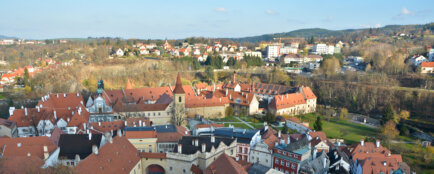What is a referendum?
A local referendum is an instrument of direct democracy where local people use their vote to decide on issues that are important in their community. The process is governed by the Local Referendum Act, which sets out how, when and who can vote. A local referendum concerns issues that fall under the independent jurisdiction of municipalities, cities, statutory cities, boroughs, urban districts or the capital city and the statutory city. Unlike an election, it focuses on individual decisions about the future of a local authority.
Who can participate in a local referendum?
Every citizen has the right to take part in a local referendum and also has the right to vote for the municipal council. This citizen must be a citizen of the Czech Republic (or a citizen of a state that allows him/her to vote on the territory of the Czech Republic). However, there are certain obstacles, such as restrictions on personal freedom by law, deprivation of legal capacity, or active military service, which may prevent participation in a local referendum.
What is excluded from a local referendum?
A local referendum cannot cover issues that are specifically defined by law. These issues include, for example, local taxes and budget, the election and removal of a mayor or mayoral candidate, issues in conflict with the law, issues decided in special procedures, the conclusion of public contracts for the exercise of delegated powers, or the approval, amendment or repeal of a general binding ordinance of the municipality. A local referendum also cannot be held within 24 months of a previous valid decision on the same matter.
Are you solving a similar problem?
Need some advice?
Do you have a question about the local referendum? Send us yours and you’ll know within 24 hours.
I have a question
- When you order, you know what you will get and how much it will cost.
- We handle everything online or in person at one of our 6 offices.
- We handle 8 out of 10 requests within 2 working days.
- We have specialists for every field of law.
Legal regulation of referendums in the Czech Republic
The basis for holding referendums is the Charter of Fundamental Rights and Freedoms, which guarantees the right of citizens to participate in the administration of public affairs directly or by freely electing representatives. Referendums are thus a valuable tool that allows citizens to influence public life and decide on key issues affecting their lives and future.
Referendums can also take place at different levels, namely national, regional and local. At the constitutional level, it is theoretically possible to hold referendums on national issues in the country. However, no bill on general referendum has been finally approved yet. Also, to date, the only national referendum remains the vote on the Czech Republic’s accession to the European Union.
Local referendums allow residents of a particular municipality to decide on local issues. The referendum must be supported by a minimum number of signatures from citizens, and the result is binding if a certain percentage of participation and votes in favour is met.
Another form is regional referendums, which allow residents of a region to vote on issues that fall within the region’s independent jurisdiction. For a county referendum to be valid, a certain turnout and a minimum number of votes are also required for a binding decision.
Tip for article
Closely related to local decision making is the Local Plan, which sets out how the local area will develop. Find out how to defend the Local Plan if the changes don’t suit you.
How does the local referendum work?
The Local Referendum Act regulates the local referendum or local popular vote. A local referendum is held if the municipal or statutory city council decides to hold it, or if a preparatory committee submits a proposal for holding it and the council decides to call it. The proposal of the preparatory committee is valid if it is supported by a certain number of eligible persons, which depends on the size of the municipality or statutory town.
The municipal or statutory city council may call a local referendum by a majority vote of all members of the council. The local referendum is then officially announced by posting the resolution on the official board of the municipality or town hall for 15 days.
The second option is to announce it on the proposal of the preparatory committee. This consists of at least three authorised persons and has certain tasks to perform. For example, it can propose a local referendum, delegate members to electoral commissions, or file a motion to invalidate the vote. The proposal of the preparatory committee must be accompanied by the signatures of the supporting authorised persons, which must be certified by the municipal authority of the municipality or the municipality of the statutory town.
Questions that cannot be asked in a local referendum are questions concerning local taxes, the budget of the municipality or statutory town, the election and removal of the mayor or mayoralty, or other questions that would be contrary to the law. Also, a referendum cannot be held if 24 months have elapsed since the last valid decision on the same question in a local referendum.
In contrast, a local referendum can typically be held on questions of the construction or alteration of important buildings such as hospitals, town halls, railway stations or other strategically important buildings. However, there is no limit to the imagination of municipal councils.
How to do it if you want to call a referendum?
A local referendum is held if the municipal council or the council of the statutory city decides to hold a referendum, or if the preparatory committee submits a proposal for a referendum and the council decides to hold one. The preparatory committee is composed of at least three authorised persons who propose the organisation of the referendum and delegate members to the voting committees.
The proposal of the preparatory committee may be submitted if it is supported by the signatures of the municipality or a part of the municipality that has:
- up to 3 000 inhabitants – at least 30% of eligible persons,
- up to 20 000 inhabitants – at least 20% of eligible persons,
- up to 200 000 inhabitants – at least 10% of eligible persons,
- over 200 000 inhabitants – at least 6% of eligible persons.
A referendum is valid when the established quorum of participation is met and a majority of those voting decides in favour of one of the options.
Specifically, the following conditions apply:
- A majority of the participating voters voted in favour
- At least 25% of all eligible voters voted in favour
- At least 35% of all eligible voters participated in the vote
The participation quorum refers to the minimum number of eligible voters who must participate in order for the referendum to be valid. This means that at least a certain percentage of eligible voters must turn up to vote in the election or referendum.
A valid referendum also requires that one of the options (e.g. ‘yes’ or ‘no’) must receive a majority of votes. If the result is a tie, or if neither option achieves the necessary majority, then the referendum is usually considered not to have taken place and no decision has been made.
Tip for article
The official notice board is an important element of public administration in the Czech Republic. What information is published on the official notice board and how can it be useful to ordinary citizens? This is the subject of our article.
Examples of referendums held
Referendums have already been held in some municipalities in the Czech Republic. A number of popular votes have been held at the local level. However, some were not valid due to lack of participation. For example, the Litoměřice referendum consisted of a vote on the sale of the Litoměřice Hospital to a private entity. The town hall was considering the sale because it subsidized the hospital’s operations with many millions of crowns each year.
The referendum on the relocation of the main railway station in Brno was the target of many articles, posts and jokes. In it, citizens could express whether they wished to modernise the Brno main railway station in its current location, but the referendum was not valid because it did not achieve the required minimum turnout of eligible voters. At the same time, the city administration launched an internet poll on the topic of the new name of the station. Among the three successful proposals was the Járy Cimrman station. Surprisingly, the name Shalingrad won.
The residents of Prague 7 also joined the local referendum when they wanted to express their opposition to the allegedly overpriced construction of the new town hall. They voted to limit the investment to CZK 500 million. In addition, they ordered the district’s management to launch an architectural competition and a tender procedure that will favour construction on land owned by Prague 7.
An interesting development was the announcement of a referendum on a possible ban on gambling in Kladno. It was originally held together with the presidential elections, but the Regional Court in Prague declared the vote in the local referendum invalid due to illegal restrictions and influence of the city, which had promoted its opinion in the campaign. In fact, the city’s leadership did not seek to ban, but at most to regulate the business in question. Subsequently, the city wanted to announce the referendum on a regular day (i.e. outside the election date), on 15 April 2023. However, two days before the referendum was to take place, the Regional Court in Prague ruled by a preliminary injunction that Kladno was obliged to refrain from organising and ensuring a repeat vote in the local referendum and ordered to combine its organisation with the election. By organising the referendum on a normal (non-election) day, there was a risk of a low turnout and thus the referendum being invalid.
Summary
A local referendum is a form of direct democracy that allows citizens to decide on local issues. Citizens with the right to vote for local councils can participate, but are subject to certain restrictions such as personal freedom under the law, disqualification from legal capacity or active military service.
Issues relating to taxation, budget, election of the mayor or legislation are excluded from the local referendum. Referenda must be supported by a minimum number of signatures from citizens and the result is binding if a quorum of participation and a majority of votes in favour are met.




